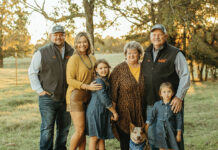 James and Jane Maginot are definitely not your typical Arkansas couple.
James and Jane Maginot are definitely not your typical Arkansas couple.
They met in rural Tanzania 10 years ago as Peace Corps volunteers. Jane was working in the environmental sector in one village while James was working in sustainable agriculture in another. They discovered a common agricultural belief system and a desire to farm together.
They moved to Northwest Arkansas in 2009 after considering three locations: Carbondale, Ill.; Columbia, Mo., and Northwest Arkansas. The four factors they considered were land price, access to population centers, a growing consumer interest in organics/sustainable/local agriculture and an economy separate from the university. Northwest Arkansas matched all four criteria.
Jane is an urban water quality educator as a University of Arkansas Extension agent, while James is the director of Waiver Programs for Bost Incorporated out of Fort Smith, Ark., which provides services for people with disabilities. The couple has two children, 3-year-old Séamus and 1-year-old Patrick.
The couple owns 80 acres in Winslow, Ark., where their Beyond Organics Farm seeks to approach agriculture holistically and through systems that exceed government labeling requirements. While many livestock farmers see themselves as grass growers first, James and Jane believe they are soil farmers first. Their biggest concern is how to grow the highest quality forage to produce manure that attracts the highest concentration of dung beetles. They use this as a slow farming technique for fertilization. This system enriches the soil which encourages a healthy livestock production environment that requires minimal human intervention in terms of fertilizing, spraying for weeds, and worming. Their livestock production includes cattle, goats, and chickens with three Pyrenees guard dogs and 50 guineas to help control ticks and mosquitoes.
Another unusual aspect of this farm is the production of South Poll cattle. They started with small-framed, dual-purpose Dexter cattle, but wanted larger meat production and switched to South Polls, a recently developed and official composite breed developed in Alabama in the 1990s. The breed is known for birthing ease, heat tolerance, proven tender meat when fed only grass, strong maternal traits and minimal inputs. It is a combination of Red Angus, Hereford, Barzona (another composite breed with excellent heat tolerance) and Senepol (a polled breed with good milk ability).
The Maginots have seven mommas and one bull that stays with the herd year round. They have never had to assist in birthing and oftentimes come home to a new, healthy calf. They wean heifers at 9 months so they will not be bred and usually retain them for herd development. Steers are kept on the cow as long as possible to increase calf health and only removed to maintain/improve the condition of the cow before her next calf. Meat is processed when the animal is generally 21 to 24 months old, though consideration is made for forage availability, rain, hay prices and hunting season when processor availability becomes more difficult.
“Another advantage to living here is the number and availability of various meat processing facilities, including a USDA inspected facility nearby in Winslow (Ark.),” James said.
Once a Dexter bull got pneumonia. The couple was torn between remaining completely antibiotic free and treating the $3,000 bull. In the end they decided a $12 shot was both more humane and financially advisable.
Another aspect of the operation is the family’s goats.
“Goats are pasture improvement tools first and foremost, but who doesn’t love playing with baby goats?” Jane said.
The goat herd is comprised of 20 Kiko nannies and a Savanna billy. The Kiko breed provides essential parasite resistance while the Savannah provides a heftier structure. Though some goats are processed for sale at market, others are reserved for ethnic populations and are butchered at the farm.
The Maginot chicken operation is twofold. The first is a 75-bird Rhode Island Red and Ameraucana egg laying operation. The second is a meat operation comprised of three batches of 100 meat chickens raised between April and November when pastures are optimal. All of the chickens are pasture-raised and unconfined which is a major reason for the presence of the three Pyrenees dogs.
All livestock are rotated amongst paddocks within permanent pastures every 48 hours or according to current weather conditions. In the spring goats and cattle share the same pasture so that the goats can eat the faster growing browse and the cattle can get to the lower growing grasses they prefer.
The Maginots market through the West Fork Garden market and through a Fayetteville online farmers market called Green Fork Farmers Market. The Green Fork Market week begins on Saturday when farmers enter into the website the products they have available for sale. On Tuesday, farmers receive email notification from the market about which/quantity products have been sold. Jane delivers orders to the market Wednesday morning, which then is packaged for customer pickup that afternoon. The advantage to this online system is that farmers don’t need to predict what they sell so they can harvest/prepare only what is ordered.
“You have to adapt to your land, which means nothing is absolute and no one practice works everywhere,” James said. “A farmer has to be a marketer, educator, and most importantly a student. I have found listening to locals and learning the social history of the land often provides the most useful information.”







